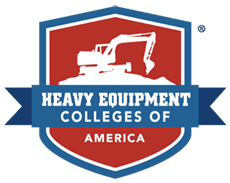Driving a forklift takes special training and certification to build the skills and knowledge to keep things running smoothly. As with every task on a construction site, there’s an inherent risk involved. However, you can be proactive in your work and minimize the dangers with basic safety practices.
If you’re certified to operate a forklift and looking for tips to keep yourself and others safe, Heavy Equipment Colleges of America (HEC) has got you covered. Here are 12 basic forklift safety tips you can implement along with safety training to help prevent dangerous accidents on a job site.
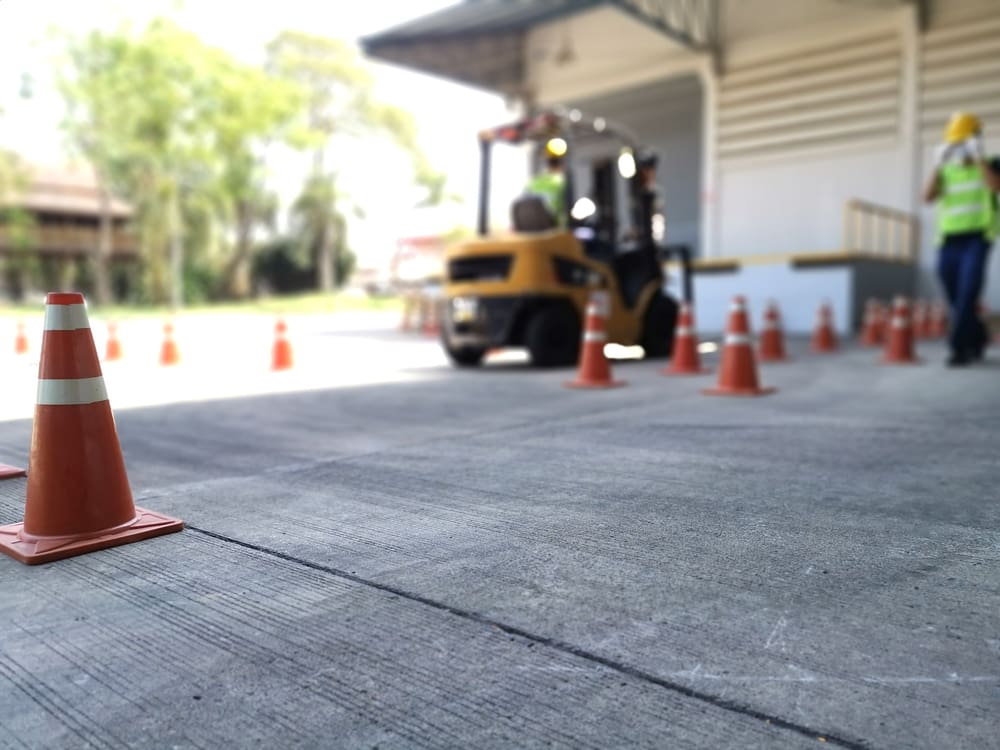
Table of Contents
OSHA Forklift Safety Tips for Operation
The Occupational Safety and Health Administration (OSHA) has a set of formal safety practices that can help keep you protected while you operate a forklift. The most crucial element emphasizes the importance of proper safety training and forklift certification that’s required to operate a forklift. Only certified and trained individuals can operate a forklift, and they must be trained on the specific type of vehicle they’ll be operating.
In addition to certification, OSHA encourages workers to operate the equipment according to the instructions provided by the manufacturer. This includes wearing a seatbelt and helmet, in addition to abiding by the machine’s weight limits.
Forklift Safety Tips: A Comprehensive Guide
When it comes to forklift operations, safety should be a top priority. These 12 safety tips can help lower the risk of job site injuries and protect yourself and others. When used with formal forklift training, you’ll help keep the entire job site safe.
1. Apply for Heavy Equipment Training
Many forklift-related accidents occur on the job site due to a lack of formal training. For this reason, forklifts should only be operated by workers who have the proper licenses and certifications that align with OSHA standards. Employers should also evaluate these operators every few years and supplement with training if the need arises.
If you’re interested in getting forklift certification, look for a trade school or community college that offers the program. Heavy Equipment Colleges of America has a heavy equipment certification program that will set you up for success in the construction industry.
Join HEC Today!
Accelerated Programs | Multiple Locations | Job Placement Help
Open The Door To A New Career!
Start Enrollment ProcessFind The Right Location For You2. Wear Proper Clothing
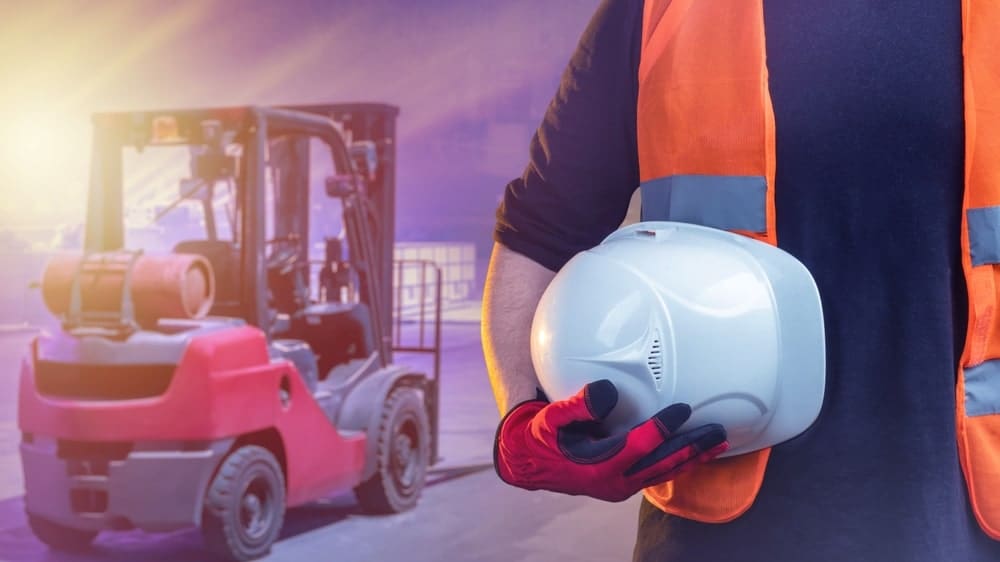
On a construction site, your clothes mean more than you think. What you wear can keep you safe or put you in harm’s way if you’re not careful. Forklift operators need to always wear protective clothing such as hard hats, reflective high-visibility jackets, and safety boots. These tools protect your head and feet while ensuring you remain visible to everyone working alongside you.
As for what NOT to wear, avoid loose-fitting or baggy clothing. A loose jacket sleeve or baggy pants can get caught in the machinery and lead to serious injuries. If your shirt is a little loose, tuck in any loose ends to prevent them from getting caught.
3. Perform Proper Equipment Inspections
You should be inspecting your forklift before every single use. Daily forklift inspections ensure your equipment is working properly and there aren’t any issues. Work with your shift supervisor to go over the equipment and make note of any defects or problems you may notice.
Daily inspections don’t have to be complicated. Basic forklift safety features to check on a daily basis include:
- Horn, lights, brakes, and steering wheel.
- Damage to the mast and overhead guard.
- Tire levels and fluids (hydraulics, fuel, coolant, brake, and engine).
- Radiator, water, or oil leaks.
4. Wear Your Seatbelt on Sit-Down Rider Forklifts
Forklifts come in a variety of styles. Some have the operator standing while they steer, while others have you sit in a seat. If you’re working with a rider forklift that has a driver’s seat, you must remain seated the entire time the equipment is in use. These forklifts come with a seatbelt to keep the driver securely in the seat, and it can’t do its job if you don’t wear it.
5. Maintain Full 360° Visibility
The forks of a forklift move up and down to raise and lower loads to where they need to be. When the forks are raised, they can block parts of your field of view. This puts others at a greater risk of getting hurt in an accident. If you need to transport a load with the forks raised, operate the crane in reverse so you maintain a 360° view of the area around you.
Other visibility tips include making eye contact with other workers so they know you’re there, looking in the direction of travel, and using rear-view mirrors to increase your field of view.
6. Don’t Carry Passengers
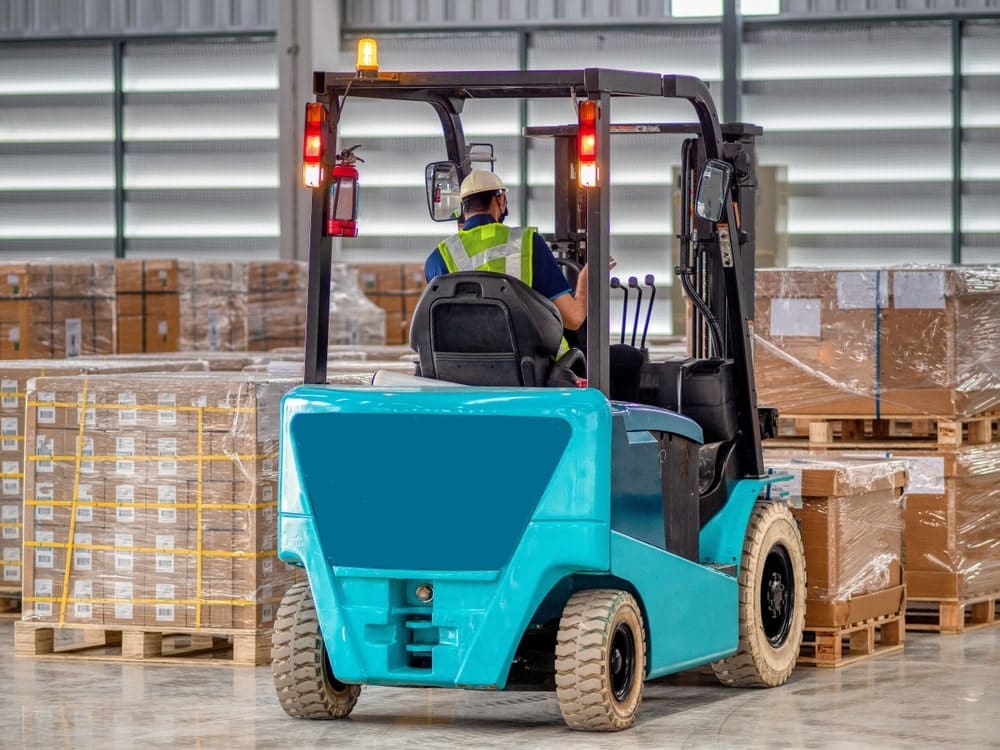
If you and a few coworkers need to travel a short distance with the forklift, it can be tempting to have them hop on and catch a ride to where you need to go. This seemingly harmless choice can compromise the safety of the forklift and put yourself and your coworkers in danger. Extra passengers can exceed the weight limit of the equipment, increasing the risk of breakdowns and workplace injuries.
7. Maintain the Appropriate Operating Speed
Every forklift has operating limits that maximize the machine’s efficiency while keeping the driver safe. These limits aren’t a suggestion, they should be treated like a hard rule that you cannot exceed.
One of these limits includes an operating speed range. This means the manufacturer tested the equipment and found it performed best when it stayed within certain speed limits. When driving a forklift, stay within the speed limit and avoid fast movements such as sharp turns and sudden stops. These movements can cause the forklift to tip over.
8. Keep a Safe Operating Distance from Other Worksite Equipment
A forklift is a massive piece of equipment that requires a certain amount of space to move around and carry loads safely. They need more space than you may think, which is why operators need to be aware of their surroundings and make sure they have ample space to drive.
Similar to driving a car on the road, you also need to keep a safe distance from other equipment on the site. If you drive a forklift too close to another vehicle, you may not have time to react in the event of a sudden stop. This can lead to a collision and serious injuries to yourself and others.
9. Make Sure Loads are Stable and Secure
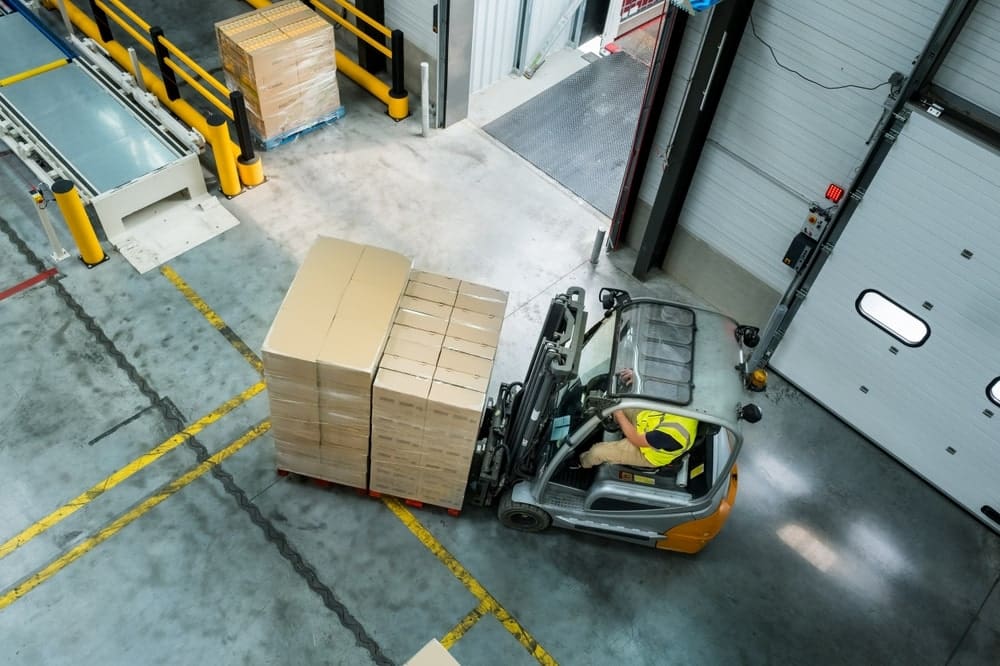
Another helpful forklift safety tip has to do with the load you’re carrying. When loading materials onto a forklift, they need to be properly balanced and secured to prevent incidents. If the load is unbalanced, it can cause the forklift to become wobbly and tip over. An unsecured load can fall off the crane and can cause both property damage and personal injuries.
10. Watch Out for Pedestrians and Objects That May be in Your Way
While a forklift is in use, the operator needs to have eyes and ears on everything around them. Lack of awareness can lead to serious injuries to yourself and pedestrians in the area, in addition to property damage in the event of a collision. Make sure you have a 360° view of your surroundings and make eye contact with pedestrians so they know you’re there.
11. Avoid Hazardous Areas Within Range of the Equipment
As mentioned before, a load can fall off a forklift without the proper precautions. This puts anyone standing next to or underneath the forklift at risk of serious injuries. Keep your body parts away from the forklift’s mast while it’s moving to lower the risk of an incident.
12. Park the Forklift at the End of the Shift
The end of a long workday is not the time to cut corners. When a job is done for the day, and the forklift is no longer needed, follow the proper storage protocols and park the equipment in the authorized and designated area. Follow the steps to properly store the equipment, including lowering the forks to the ground, engaging the parking brake, turning off the engine, and removing the key from the ignition.
We Are The Best Value For Forklift Certification
If you’re interested in working as a forklift operator, the first step is to earn certification from an accredited school or institution. Heavy Equipment Colleges of America offers not only OSHA certification courses, but our heavy equipment programs are designed to set you up for a successful career as a forklift operator. With first aid training and operator guides, you’ll be able to hit the ground running. Our certification programs include:
Contact Heavy Equipment Colleges of America Today!
Apply online for one of our heavy equipment programs and certifications to begin your career in the construction industry. For more information on our programs or application process, our admissions representatives are more than happy to help answer any questions you may have.
Join HEC Today!
Accelerated Programs | Multiple Locations | Job Placement Help
Open The Door To A New Career!
Start Enrollment ProcessFind The Right Location For You